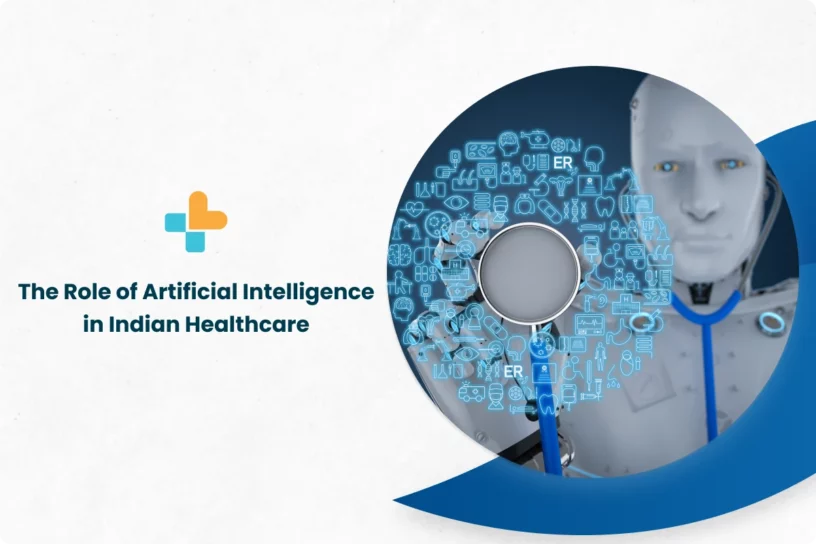Researchers and medical professionals from all over the world are interested in the application of artificial intelligence (AI) in the healthcare industry. While the west has integrated the technology rapidly, India has yet to reach there, in terms of active use of AI in healthcare. Anything from medication development to predicting renal disease AI is here to revolutionize the healthcare industry for the better. This blog discusses the involvement of artificial intelligence in the medical field, in the context of Indian healthcare.
Applications of digitalization and AI in healthcare
By allowing quicker and more accurate diagnoses, enhancing patient outcomes, and cutting costs, digitalization and AI are revolutionizing healthcare. Telemedicine and electronic health records are two instances of digitalization that enhance transparency and interaction among patients and healthcare professionals.
Large amounts of medical data and pictures are being analyzed using AI-powered technologies, such as machine learning algorithms, language processing algorithms, and machine vision, to provide more precise diagnoses and individualized therapies. AI has an immense capacity to improve the accuracy and efficiency of medical treatments.
Bridging the gap with telemedicine
In especially for those who reside in distant or underdeveloped locations, telemedicine is a critical tool that is closing the healthcare access gap. This was seen globally during the pandemic when people couldn’t move out of their homes. Using telemedicine, healthcare providers were made accessible in the comfort of homes, via phone or video calls.
Reducing the administrative burden on doctors with Artificial Intelligence (AI)
Lots of hospitals and nursing homes in India have extremely complex and daunting paperwork before the real treatment can begin. Along with the serious nature of a physician’s work, this adds up extra load on them, contributing to burnout. Instead of focusing on providing the best treatment, doctors get exhausted handling the administrative burdens. Using AI seems to be a prospective solution for this healthcare technology problem. AI can deal with lots of complex datasets in a short time, help with the billing process, etc. Moreover, AI-based physician documentation is far more accurate. The workload involved with recording patient contacts is already being reduced by voice recognition and other measures, but conversational and contextual AI will enable much larger improvements in Indian healthcare.
Diagnosis and patient care
AI has been contributing a lot to medical diagnosis and supporting radiologists for providing better diagnosis reliability. For example, the AI healthcare solution Aidoc is very efficient in screening multiple images together during medical imaging, detecting those of special concern, or further checking. This saves a lot of time, especially for the radiologist who studies the scans for medical diagnosis.
Providers can quickly access medical data, evaluate patient history, see patterns, and suggest therapies thanks to easy-to-interpret AI. These elements support focusing on specific symptoms and classifying the degree of the risk for every patient while maintaining an emphasis on the patient’s welfare and the standard of treatment.
Enhancing treatment with robotic surgery
Robotic surgery improves surgical precision, vision, and convenience for surgeons while reducing patient discomfort and time to recover. The robot does not act independently. Along with other tools and technologies, the surgeon performs the surgery using a robotic system. Interactive arms on the surgical robot work as hands-on extensions for the surgeon. Such arms have cameras and surgical instruments. They have the ability to clamp, cut, and suture tissues. As the robotic arms have a wider range of motion than the human wrist, surgeons may effectively access challenging locations with less harm to the nearby tissues. Robotic surgery is a beneficial healthcare innovation and has been used to treat conditions such as uterine fibroids, hernia, appendicitis, colorectal cancer, etc.
Improving patient experience with chatbots
Also known as conversational AI, chatbots have been designed to imitate human conversations. Almost all patients today have two essential characteristics: they all keep cellphones in their pockets, and they all demand 24/7 quick, precise service. In case any sudden symptoms arise, chatbots can provide answers to that conveniently. Chatbots can offer a private, secure, and practical setting where people can seek advice and ask questions without feeling judged or scrutinized. In order to capture and monitor sentiment, chatbots can also help with surveys as well as other patient feedback systems. Chatbots are furthermore able to respond to inquiries about scheduling, finding existing appointments, and simplifying the booking of brand-new appointments.
Final say
It is clear by now that the use of artificial intelligence in healthcare can serve as a boon, boosting the overall efficiency of treatments and improving patient experience. However, for India, the challenges are far more to ignore for now. Starting with a lack of funding to weak IT infrastructure, there are quite a few problems to tackle. The government has to intervene and introduce useful regulations and bring funding if this has to work for Indian healthcare.
At Ayu Health, advanced treatment options and healthcare technology are available for patients, catering to their individual medical needs. For an appointment or more information, contact 6366100800.
Our Hospital Locations
General Surgery Hospitals in Chandigarh | General Surgery Hospitals in Bangalore | General Surgery Hospitals in Jaipur | General Surgery Hospitals in NCR | General Surgery Hospitals in Hyderabad
Our Doctors
General Surgery Doctors in Chandigarh | General Surgery Doctors in Bangalore | General Surgery Doctors in Jaipur | General Surgery Doctors in NCR | General Surgery Doctors in Hyderabad
About the Author

Dr. S. Goel
Dr. S. Goel is a renowned Internal Medicine Specialist currently practicing at Ayu Health, Bangalore. He is a Specialist in Internal Medicine, Diabetes HTN, Paediatric Care, and Family Medicine.




